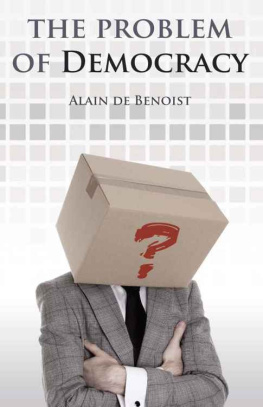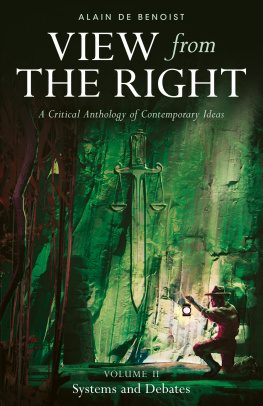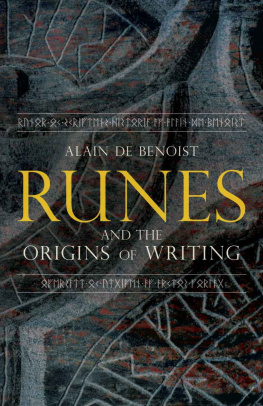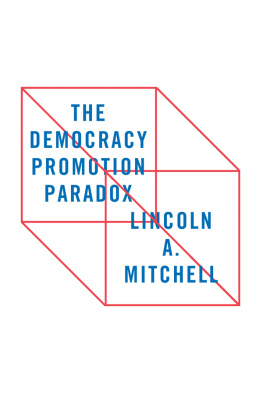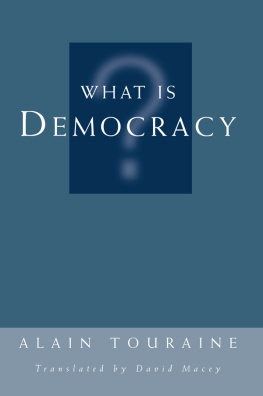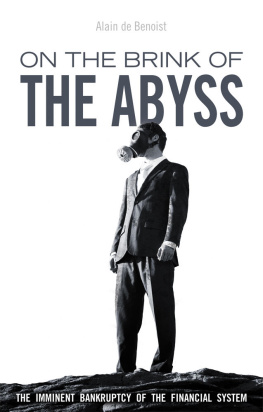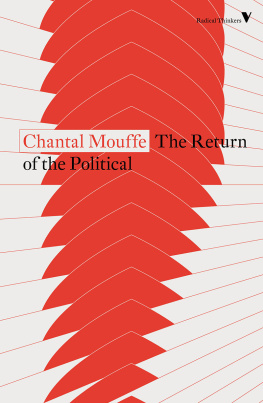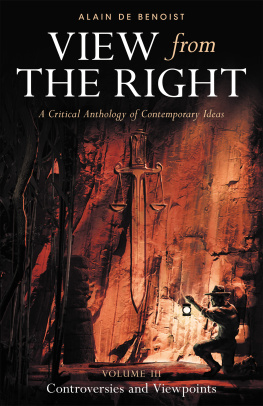The Problem of Democracy
The problem of
Democracy
Alain de Benoist
ARKTOS
MMXI
First English edition published in 2011 by Arktos Media Ltd., originally published as Dmocratie: le problme (Paris: Le Labyrinthe, 1985).
2011 Arktos Media Ltd.
No part of this book may be reproduced or utilised in any form or by any means (whether electronic or mechanical), including photocopying, recording or by any information storage and retrieval system, without permission in writing from the publisher.
Printed in the United Kingdom
isbn 978-1-907166-16-7
BIC classification: Social & political philosophy (HPS)
Political structures: democracy (JPHV)
Translator: Sergio Knipe
Editor: John B. Morgan
Cover Design: Andreas Nilsson
Layout: Daniel Friberg
Proofreader: Matthew Peters
ARKTOS MEDIA LTD
www.arktos.com
Table of Contents
A Note from the Editor
A lain de Benoists text already contained a substantial number of footnotes, all of which have been retained for the present edition. To these I have added additional footnotes where I felt they would be helpful, either to explicate references or to allow the reader to more deeply explore de Benoists sources. Notes added by myself are so indicated, while notes with no indicator are part of the original text. Also, wherever texts have been referenced, they have been replaced by references to the English-language originals or translations, when they are available. Works that have not been translated are retained in their original language.
When reading the text, please keep in mind that de Benoist originally wrote and published this book in 1985. Although the developments during the intervening years in no way detract from the value of his observations, he does make occasional reference to contemporary circumstances which no longer exist, in particular the Soviet domination of eastern Europe.
Finally, both the translator and the editor wish to acknowledge the assistance they received by consulting Dr. Tomislav Sunics previous translation of the first chapter of this book, which was published in the Summer 2003 issue of Th e Occidental Quarterly . Although this book, including the first chapter, is an entirely original translation, Dr. Sunics text was extremely valuable in clarifying some passages.
John B. Morgan
Dmocratie: le problme (Paris: Le Labyrinthe, 1985).
PREFACE
T hose who love to regurgitate the word democracy are usually those who know little about its meaning in the first place. One could draw a parallel with a criminal on trial who never calls himself a crook. It is only his accusers who call him a crook. De Benoist rightly states that every single political actor today, regardless of which corner of the Earth in which he may dwell, likes to decorate himself with the noun democracy. Every tiny criticism of that word, each skeptic who doubts its current methods of employment, is immediately denounced as undemocratic. Even discussing the notion of our modern liberal democracy means to step onto the minefield of a new religion, whereas making any critical comment about modern liberal democrats is tantamount to intellectual suicide.
The noun democracy works miracles, to the point that its four syllables, demo-cra-cy, when loudly uttered in public, easily disarm any of its adversaries and dismiss all of its critics. This word, especially when inscribed on the banner of the modern liberal system, can also become the ideal cover for the most despicable political crimes. In recent history it came in handy as an alibi for carrying out serial killings against custom-designed non-democratic political actors. Or, for that matter, its loftier expression, such as fighting for democracy, can serve beautifully as a safe venue for firebombing entire non-democratic nations into submission. The surreal beauty that this generic noun implies, based on the specific time and place of its user, can mean everything and nothing at the same time. Today, this noun and its democratic qualifiers have become part and parcel of every politicians lexical arsenal. God forbid if a politician in the West dares to voice critical views of its quasi-religious significance! Not long ago, the Christian masses in Europe were obliged to chant cantate domino in order to reassure themselves, amidst their suspicious co-religionists, of their eternal devotion to the singular Lord in Heaven, and thus avoided the risk of being chastised as heretics, or being burned at the stake as devils incarnate. Back then, nobody wanted to be ratted out for seeing the shortcomings of the dominant belief, or kicked out of his community for being out of the monotheist loop! Hallelujah!
Similar fancy buzzwords, such as Son of Yahweh, and a plethora of other Levantine sermons from Sinai, are still heard amidst the enraptured congregations of the Bible Belt. These words are still in use as the pious trademarks of the chosen people. Short of that, for an agnostic or a more urbane layman, the divine word democracy can work miracles if he is desperately scrambling for an effective way to complete his dangling and embarrassing sentence. An American serial killer often discovers an alibi for his misdeeds by invoking loudly in court, God made me do it! We should not blame him too harshly. During the Second World War the self-proclaimed democratic world-improvers, both from the east and from the west, used the normative principles of democratic limitations to justify large-scale killings and expulsions and the exclusion of their non-democratic foes. Tomorrow, should the Third World War break out, it will likely be rationalised by the adherents of democracy, who will invoke the already well-tested phrase, Lets make the world safe for democracy!
Yes, that was the word in the beginning. And then came the ugly deed. It is therefore a merit of the philosopher Alain de Benoist that before tackling the concept of the political within the democratic system, he first deals with the etymology of the word and its semantic deviations and aberrations in different historical epochs. After following his narrative, which he skillfully outlines in this little book, one can only come to the conclusion that the current overuse of the word democracy often results in inter- and infra-political mayhem which will likely bring about political catastrophes in the near future.
All those who are familiar with Alain de Benoists books know very well that all of them are instructive. They represent a treasure trove of various ideas, ranging from literature, art, and history to political science, and they all attest to a man of classical erudition. This little book on democracy is especially important, because it directly examines a mystical term of our times and which recurs in our daily communication. The notion of modern democracy, which Alain de Benoist dissects in detail, is not just a label for a form of (anti-)government; it is first and foremost a label for the all-encompassing imagery which is being projected for the benefit of the public; a pervasive system of symbolism which even an uneducated man from the street must confront on a daily basis.
There are several reasons why this book is obligatory reading for any student of democracy let alone for undergraduate students in the humanities. First there is the language of the book. Alain de Benoists style is always limpid with a simple, didactic message. His style is not an arcane one designed for a chosen few. Even when reading him in an English translation, it does not pose a massive headache for a novice. A reader does not need to be versed in high-tech political jargon in order to understand his main thesis as is often the case with many experts hiding behind flowery and vague sentences, often in an attempt to conceal their substantial ignorance.

